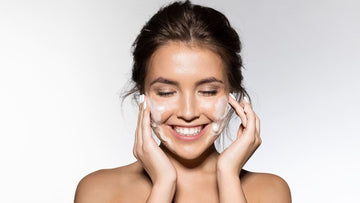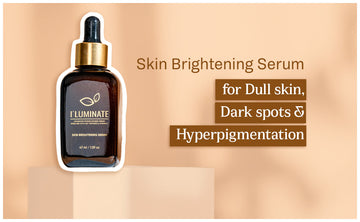Acne and pimples can be a persistent and frustrating problem for many people. While it might seem like an endless battle, the right skincare routine and products can make a significant difference. Here's a comprehensive guide on how to take care of acne-prone skin and use the correct facial products to achieve clearer, healthier skin.
Understanding Acne and Pimples
Acne is a skin condition that occurs when hair follicles become clogged with oil (sebum) and dead skin cells. This can result in blackheads, whiteheads, pimples, or cysts. Factors such as hormones, stress, diet, and improper skincare can contribute to acne. Understanding these factors is crucial for effective treatment.
Essential Skin Care Tips for Acne-Prone Skin
1. Gentle Cleansing : Morning and Night
Wash your face twice a day with a gentle, non-comedogenic cleanser. Avoid harsh soaps that can strip your skin of its natural oils and exacerbate acne. Look for cleansers containing salicylic acid or benzoyl peroxide, which help to unclog pores and reduce inflammation.2. Regular Exfoliation: Once or Twice a Week
Exfoliating removes dead skin cells that can clog pores and lead to breakouts. Use a mild exfoliant with ingredients like alpha hydroxy acids (AHAs) or beta hydroxy acids (BHAs). Avoid over-exfoliating, as this can irritate your skin and worsen acne.3. Toning: After Cleansing
Toning helps to balance your skin's pH and remove any leftover impurities. Choose an alcohol-free toner with soothing and antibacterial ingredients like witch hazel or tea tree oil.4. Moisturizing: Twice Daily
Even acne-prone skin needs hydration. Use a lightweight, oil-free moisturizer that won’t clog pores. Look for products labeled "non-comedogenic" and those containing ingredients like hyaluronic acid or niacinamide, which hydrate and soothe the skin.5. Sun Protection: Daily
Sunscreen is essential, especially when using acne treatments that make your skin more sensitive to the sun. Apply a broad-spectrum SPF 30 or higher sunscreen daily. Opt for a non-comedogenic, oil-free formula to prevent breakouts.Choosing the Right Face Products
1. Cleansers
- Key Ingredients: Salicylic acid, benzoyl peroxide, tea tree oil.
- Why: These ingredients help to unclog pores, reduce inflammation, and kill acne-causing bacteria.
2. Exfoliants
- Key Ingredients: AHAs (like glycolic acid), BHAs (like salicylic acid).
- Why: They help to remove dead skin cells, prevent clogged pores, and promote cell turnover.
3. Toners
- Key Ingredients: Witch hazel, tea tree oil, rose water.
- Why: These ingredients balance the skin’s pH, tighten pores, and provide antibacterial benefits.
4. Moisturizers
- Key Ingredients: Hyaluronic acid, niacinamide, ceramides.
- Why: They hydrate without clogging pores and soothe inflammation.
5. Sunscreens
- Key Ingredients: Zinc oxide, titanium dioxide.
- Why: These mineral sunscreens provide broad-spectrum protection without clogging pores.
Additional Tips for Managing Acne
1. Spot Treatments
For Active Pimples: Use spot treatments with benzoyl peroxide or salicylic acid to reduce inflammation and kill bacteria. Apply directly to pimples to minimize irritation.2. Prescription Treatments
For Severe Acne: Consult a dermatologist for stronger treatments like retinoids, oral antibiotics, or hormonal treatments. These can effectively manage more severe cases of acne.3. Lifestyle Adjustments
Healthy Diet: Incorporate foods rich in antioxidants, vitamins, and minerals, such as fruits, vegetables, nuts, and whole grains. Reduce intake of high-glycemic foods, dairy products, and processed foods that may trigger acne.
Hydration: Stay hydrated by drinking plenty of water to maintain your skin’s moisture balance and flush out toxins.
Stress Management: Engage in stress-reducing activities like exercise, meditation, yoga, or hobbies. Stress can trigger or worsen acne, so managing it is crucial.
4. Avoid Picking and Touching Your Face
Hands Off: Picking at pimples can lead to scarring and infection. Keep your hands away from your face and use proper acne treatments instead.5. Consistency and Patience
Stick to Your Routine: Consistency is key in managing acne. Stick to your skincare routine and give products time to work. It may take several weeks to see noticeable improvements. Avoid frequently switching products, as this can irritate your skin and delay results.
Dealing with acne and pimples requires a thoughtful and consistent skincare approach. By understanding your skin type, following a proper skincare routine, and using the right products, you can effectively manage acne and achieve clearer, healthier skin. Remember to be patient and persistent, as finding what works best for your skin may take time. If over-the-counter treatments aren't working, don't hesitate to seek advice from a dermatologist. Your journey to clearer skin starts with the right care and dedication.




